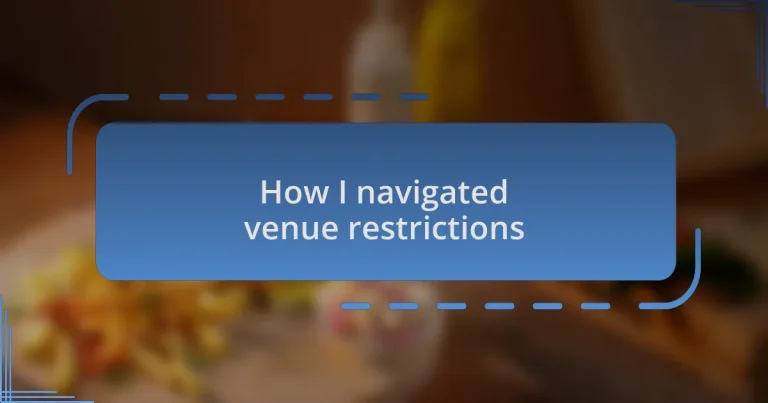Key takeaways:
- Understanding venue restrictions is essential for successful operations, ensuring safety and compliance.
- Obtaining food truck permits builds trust with authorities and enhances business opportunities.
- Adaptability and creativity in menu offerings can turn venue challenges into opportunities for innovation.
- Effective communication and teamwork with venue managers and other vendors lead to smoother event experiences.
Author: Olivia Hartwell
Bio: Olivia Hartwell is a contemporary fiction author known for her compelling narratives and vivid characterizations. With a background in literature and creative writing, she has a keen eye for detail and a passion for exploring the complexities of human relationships. Olivia’s debut novel, Whispers of the Heart, received critical acclaim and was nominated for several literary awards. When she’s not writing, she enjoys hiking in the mountains of Colorado and sipping artisanal coffee at local cafes. Olivia resides in Denver with her beloved rescue dog, Rosie.
Understanding venue restrictions
Navigating venue restrictions often feels daunting, but understanding their nuances is crucial for success. I remember the first time I encountered a venue’s strict regulations; it was overwhelming to figure out what I could and couldn’t do. Have you ever faced a situation where you felt completely constrained by rules? It can be frustrating, but these restrictions are often in place for safety or logistical reasons.
When I started the Gourmet Burger Truck, I encountered various restrictions, like space limitations and health regulations. I had to learn how to adjust my menu to fit kitchen constraints. Did you know that some venues even require specific permits for outdoor cooking? These little details can make a significant difference in how you operate.
Having a clear understanding of these venue restrictions can set you up for a smoother experience. I found that keeping open lines of communication with venue managers helped clarify what was possible. It made me realize that asking questions isn’t just okay; it’s essential for ensuring you can deliver the best service possible. Have you taken the time to ask your venue manager about their specific rules? You might uncover opportunities to innovate within those limits.
Importance of food truck permits
When I first launched the Gourmet Burger Truck, I quickly realized that obtaining food truck permits was not just a bureaucratic hurdle; it was essential for building trust with local authorities. I recall the nervous excitement I felt while waiting for my permits to get approved, knowing they represented my commitment to safety and compliance. Have you ever felt that mix of anticipation and anxiety? It’s a hallmark of entrepreneurship, especially in the food industry.
Permits serve as a badge of legitimacy, ensuring patrons that their health and safety are a priority. I vividly remember a day when a health inspector visited my truck. Having my permits in hand not only boosted my confidence but also impressed the inspector, which resulted in a smooth inspection process. It made me realize that these permits are more than just paperwork; they are vital to operating legally and avoiding potential fines or shutdowns.
In my experience, the right permits can even open doors to better business opportunities. For instance, once I secured my outdoor cooking permit, I was able to attract more customers at outdoor festivals. It was exhilarating to see how having the necessary documentation expanded my reach! Have you considered how the right permits could transform your food truck experience? They truly can pave the way for new avenues you hadn’t even thought possible.
Strategies for compliance with restrictions
One key strategy I found helpful in navigating venue restrictions was establishing open communication with local authorities. When I attended a community meeting regarding event regulations, I felt a surge of clarity about the dos and don’ts for food trucks. Engaging directly with officials not only clarified the rules but also forged relationships that proved invaluable during inspections and events. Have you ever thought about how a simple conversation can be the first step in building trust?
Additionally, I learned the importance of adapting my menu to fit specific venue guidelines. During a street fair, I faced restrictions on cooking methods, so I pivoted to offer gourmet burgers that required minimal prep and were easily customizable. It was a creative challenge that surprisingly drew more customers and made my offerings stand out. Have you ever had to think on your feet like that? I realized that flexibility can turn obstacles into opportunities.
Documenting all compliance-related processes was another strategy that I implemented with great results. Initially, I kept everything in a binder, from health inspection records to permit copies. However, I soon transitioned to a digital format that allowed easy access and updates. It was a small change, but being organized eased my stress before events, making the whole experience more enjoyable. How does keeping things organized help you in your daily operations? For me, it was a game-changer.
Adapting to unique venue challenges
Navigating unique venue challenges required me to embrace creativity and think outside the box. I remember setting up at a local park where certain areas were off-limits for cooking, which initially felt like a setback. But rather than seeing this as a limitation, I reimagined my setup to create an inviting space that highlighted my brand while adhering to the restrictions. Have you ever turned a constraint into a canvas for new ideas?
I also learned that understanding the venue’s layout was crucial. While prepping for one particular event, I found myself in a tight spot because my truck’s placement made it hard for customers to access my menu. By quickly adjusting my setup and repositioning my service window, I not only improved the flow but also boosted my sales that day. It reinforced a valuable lesson: sometimes, the smallest adjustments can lead to the biggest rewards. Does that resonate with your experiences in overcoming venue challenges?
Furthermore, I discovered that teamwork played an essential role in successfully navigating these venue-specific obstacles. Collaborating with fellow vendors often led to solutions I hadn’t considered. I vividly recall working alongside a local coffee truck at a festival, and we shared resources, which made it easier for both of us to comply with health guidelines while keeping our customers happy. It was a reminder that in facing challenges, we’re all part of a bigger community. How often do you lean on others to tackle hurdles?
My personal experience with venues
There was a time when I faced a venue’s strict noise restrictions that threatened to derail our lively atmosphere. I remember feeling a mix of frustration and determination. Instead of letting that dampen the spirit, I decided to create a more intimate and engaging experience, using acoustic music to enhance the mood without violating the rules. Have you ever found that a challenge pushed you to innovate in ways you never expected?
At another venue, I encountered unexpected layout constraints that forced me to rethink my entire service flow. It was a bustling street fair, and my designated space was cramped, making it tough for customers to line up. Rather than getting overwhelmed, I chose to embrace the chaos, adding some playful signage to guide customers and even spark conversations. This tweak elevated the excitement around my truck, transforming a potential downside into a lively buzz. Have you ever turned chaos into an opportunity to bond with your audience?
One of my most memorable experiences happened when I realized the importance of flexibility while dealing with a venue that required pre-approved menus. Initially, I felt constrained by the limitations, but then I began to see it as a chance to engage creatively. By designing a special, venue-exclusive burger, I not only complied with the rules but also created a unique offering that attracted curious foodies. Reflecting on that moment, I can’t help but wonder: have you ever found freedom within restrictions?
Tips for overcoming venue obstacles
When navigating venue restrictions, communication is key. I reached out to venue managers ahead of time, discussing potential hurdles and brainstorming solutions collaboratively. This proactive approach often led to adjustments that benefited both parties. Have you ever found that simply talking things through puts you on the same side?
Understanding the venue’s layout can also play a crucial role in overcoming spatial challenges. I once mapped out a customer flow chart to identify bottlenecks, allowing me to reposition my truck to create a smoother experience. By anticipating traffic patterns, I turned a tight squeeze into a well-oiled machine. How often do we overlook the power of planning?
Lastly, creativity truly shines when restrictions are at play. I remember adapting my menu dramatically to fit a location’s theme, which not only fulfilled the venue’s requirements but also captivated the crowd. It was fulfilling to see how thinking outside the box not only solved a problem but also created a memorable experience. Have you ever tapped into your creative side to turn a limitation into an asset?


